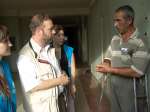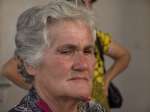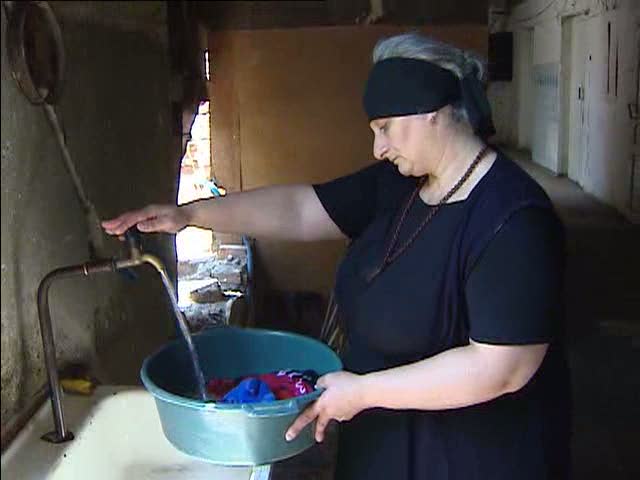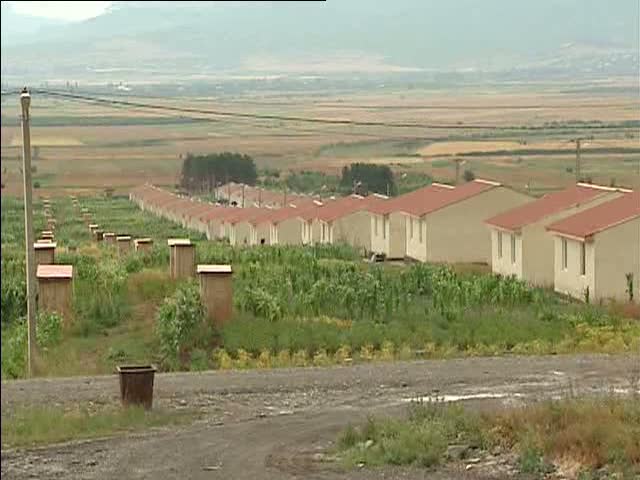Irish athletes give sportswear, hope to refugees in Georgia
News Stories, 28 December 2007

DUBLIN, Ireland, December 28 (UNHCR) – The UN refugee agency recently joined some of Ireland's finest athletes as they were fitted out in Dublin with their competition gear for the 2008 Beijing Olympic Games.
UNHCR was at the Olympic Council of Ireland's (OCI) headquarters to promote the "Giving is Winning" programme, a joint project with the International Olympic Committee to encourage athletes and national Olympic committees to give surplus sportswear to refugees worldwide.
The initiative was first launched for the Athens Olympics in 2004, when more than 30,000 items were collected to support sports among young refugees in places such as Afghanistan, Azerbaijan, Eritrea, Kosovo and Tanzania.
The OCI is shipping 400 items of surplus sports clothing to refugees in Georgia this month. The clothes will join a larger shipment to the Caucasus nation to support sports activities among some 1,100 refugees from Chechnya and 250,000 internally displaced Georgians.
OCI President Pat Hickey said the council would actively encourage Ireland's Olympic athletes to support the Giving is Winning initiative. "I am confident that our athletes and team support personnel for the Beijing Games will prove very generous in supporting this excellent project," he said.
The programme aims to collect 10 containers of clothes from national teams around the world. Already 27,392 items of clothing have been collected, filling nearly two containers. Singapore recently sent more than 800 items of sportswear to Moldova under the scheme.
The project offers "a fantastic opportunity to put surplus gear to a good use," said long-distance race walker Jamie Costin, a veteran of the Sydney 2000 games.
Seeing Israeli and Palestinian Olympic athletes walking together has convinced him that conflicts can be solved. "If it can happen in the Olympic village, it can happen elsewhere," Costin said.
UNHCR Representative in Ireland Manuel Jordão said the Irish athletes' donation of surplus sportswear showed "the Olympics is a truly unique global movement and part of the wider humanitarian cause."
The Irish contribution was also welcomed by Peter Nicolaus, UNHCR's representative in Georgia, where the Giving is Winning project has already distributed sports tee-shirts to some 500 refugees.
"For young people displaced by conflict and facing an often bleak and unpredictable future, the gift of Olympic sportswear is a great morale booster," he said. "It tells them they haven't been forgotten, and that someone cares. It gives real hope and inspiration to these children."
The Giving is Winning programme has made a difference among young refugees who have often fled war or have even been forced into armed conflict themselves. Some grow up in camps with little or no access to sport or recreation.
Nicolaus said Ireland's gift of sportswear will help maintain sporting activities among refugee and displaced children in Georgia. Sport, he added, has a "unique power to give a sense of normality to their lives, help ease trauma and integration."
UNHCR has promoted the benefits of sport for young refugees after seeing how it develops tolerance, cooperation and appreciation of rules. The ability of sports to motivate children to attend camp schools is also particularly important for girls.
Now busy preparing for the Beijing Olympics – just some 220 days away – the OCI is to be commended for taking time to think of the more than 32 million refugees and internally displaced in the world, UNHCR's Jordão said.
"By giving, they share a sense of hope with refugees, which can have a long-lasting effect. This is truly the Olympic spirit in action."
By Steven O'Brien in Dublin, Ireland






















